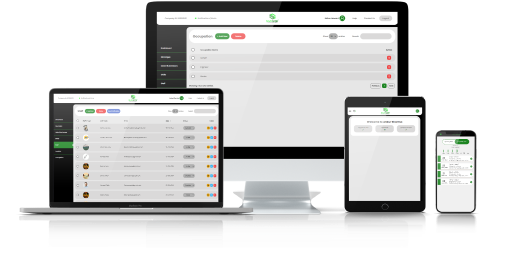Does your small business struggle to keep up with human resources demands? Say goodbye to endless paperwork and inefficient processes with our top HR software solutions! This article delves into how revolutionary HR technology can streamline your operations, boost productivity, and enhance employee satisfaction. With the right tools in place, you can focus on growing your business while automated systems take care of essential HR tasks. From managing payroll and benefits to tracking performance and attendance, these software solutions are a game-changer for small businesses looking to compete in today’s fast-paced market. Discover how embracing innovation in your HR processes can transform the way you do business and propel your company to new heights. Revolutionize your approach to HR management and unlock the full potential of your small business with the right software at your fingertips.
Understanding the Importance of HR Software for Small Businesses
In today’s dynamic business environment, the importance of Human Resources (HR) cannot be overstated, especially for small businesses. As these enterprises strive to compete with larger organizations, effective management of human resources becomes crucial. HR software serves as a vital tool, enabling small businesses to streamline their operations, improve efficiency, and reduce the burden of administrative tasks. By automating HR functions, such as payroll processing, shifts scheduling, and time tracking, small businesses can allocate more resources towards growth and innovation.
Moreover, HR software enhances compliance with labor laws and regulations, which is especially important for small businesses that may lack the legal expertise of larger firms. With features designed to keep track of employee records and ensure adherence to various legal requirements, HR software can help mitigate risks associated with non-compliance. This not only protects the business from potential legal issues but also fosters a culture of transparency and accountability, which is essential for any organization’s success.
Additionally, the implementation of HR software can lead to improved employee engagement and satisfaction. By providing employees with easy access to their personal information, benefits, and company policies, businesses demonstrate a commitment to their workforce. This empowerment can significantly boost morale and productivity, creating a more positive work environment. In essence, adopting HR software is not just about managing human resources; it is about cultivating a thriving workplace where both the business and its employees can flourish.
Key Features to Look For in HR Software Solutions
When selecting HR software for your small business, it is essential to consider key features that cater specifically to your unique needs. One of the most crucial aspects is the software’s ability to handle payroll processing accurately and efficiently. Look for solutions that offer automated payroll calculations, tax management, and compliance features that reduce the likelihood of errors and ensure timely payments. This functionality is vital for maintaining employee satisfaction and trust, as payroll is one of the most sensitive aspects of HR management.
Another important feature to consider is employee self-service capabilities. HR software that allows employees to keep updated on their shift patterns, submit requests for time off, and update personal information fosters autonomy and reduces the workload on HR personnel. This not only streamlines processes but also leads to a more empowered workforce. Furthermore, the ability to generate reports related to employee performance and attendance can provide valuable insights, aiding in better decision-making and resource allocation.
Benefits of Implementing HR Software in Your Small Business
Implementing HR software can yield numerous benefits for small businesses, significantly influencing their overall performance and growth trajectory. One of the most noticeable advantages is the time saved through automation. Routine tasks such as shift scheduling, employee onboarding, and time tracking can be handled more efficiently, freeing up valuable time for HR professionals to focus on strategic initiatives that drive business growth. This shift from administrative tasks to strategic planning enhances the overall productivity of the HR department.
Moreover, HR software enhances data management and security. With sensitive employee information stored securely in a centralized system, businesses can better protect against data breaches and unauthorized access. Robust security features, such as encryption and user authentication, ensure that only authorized personnel can access sensitive information. This not only safeguards the company’s reputation but also builds trust with employees, who feel confident that their personal data is being handled securely.
Additionally, the analytical capabilities of modern HR software provide small businesses with valuable insights into workforce trends and performance metrics. By leveraging data analytics, companies can identify areas for improvement, track employee engagement, and forecast future staffing needs. These insights enable small businesses to make informed decisions that align with their strategic goals, ultimately fostering a culture of continuous improvement and adaptability in an ever-changing market.
How to Choose the Right HR Software for Your Small Business
Choosing the right HR software for your small business requires careful evaluation of your specific needs and long-term goals. Start by identifying the key HR functions that require improvement within your organization. For instance, if shift scheduling is a major pain point, prioritize software solutions that excel in this area. Conversely, if employee engagement and performance tracking are your primary concerns, look for software that offers robust analytics and reporting tools.
It is also essential to consider the scalability of the HR software. As your business grows, your HR needs will evolve. Therefore, opt software that can accommodate increased complexity and additional features as required. A flexible solution that allows for easy upgrades and integration with other systems will save you from the hassle of switching platforms in the future.
Furthermore, don’t underestimate the importance of user experience. The selected HR software should be intuitive and accessible to all employees, not just the HR team. Conduct demonstrations or trials to assess how easily your team can navigate the software. Gathering feedback from potential users during the selection process can provide valuable insights and ensure that the tool chosen aligns with the needs of the entire organization.
Implementing HR Software Effectively in Your Small Business
Once you have selected the appropriate HR software, the next step is to implement it effectively within your small business. A well-planned implementation strategy is crucial for maximizing the benefits of the software and minimizing disruptions to your operations. Start by establishing a dedicated implementation team that includes key stakeholders from HR, IT, and management. This collaborative approach ensures that all perspectives are considered and helps in addressing any potential challenges early on.
Next, create a detailed implementation timeline that outlines the various phases of the rollout. This timeline should include milestones such as data migration, system configuration, and testing. It is also important to communicate the plan to all employees, setting clear expectations regarding the transition process. Transparency during this phase will help alleviate any concerns and prepare your workforce for the upcoming changes.
During the implementation process, don’t overlook the importance of data accuracy. Ensure that all employee information is correctly migrated to the new system to avoid discrepancies later on. Conduct thorough testing of the software to identify any issues before it goes live. Once the system is operational, continue to monitor its performance and gather feedback from users to make any necessary adjustments. This proactive approach will help ensure that the HR software is effectively supporting your business objectives.
Training and Support for HR Software Users
Training is a fundamental component of successfully integrating HR software into your small business. Providing comprehensive training for all users ensures that employees feel comfortable navigating the new system and utilizing its features effectively. Start by developing a training program that includes various formats, such as in-person workshops, online tutorials, and instructional documentation. This diverse approach accommodates different learning styles and helps reinforce the training material.
Additionally, consider appointing software champions within your organization. These individuals can serve as go-to resources for their colleagues, providing assistance and guidance as needed. Having designated champions fosters a sense of ownership and encourages employees to engage with the new system more proactively. Moreover, regular check-ins and refresher training sessions can help reinforce skills and keep employees updated on any new features or updates.
Support options are equally important in ensuring user satisfaction with the HR software. Look for solutions that offer robust customer support, including live chat, email assistance, and a comprehensive knowledge base. This support can be invaluable during the initial stages of implementation and beyond, as users may encounter challenges or have questions about specific functionalities. A strong support system enhances user confidence and ensures that the software is utilized to its full potential.
Cost Considerations for HR Software Implementation
Cost is a significant factor when considering the implementation of HR software for your small business. While investing in technology can yield substantial long-term benefits, it is essential to have a clear understanding of both upfront and ongoing costs. Start by evaluating the pricing structures of various software solutions, which may include subscription fees, implementation costs, and potential add-on expenses for additional features or integrations.
In addition to direct costs, consider the potential return on investment (ROI) associated with the software. Analyzing how much time and resources can be saved through automation can help justify the initial expenditure. For instance, if HR software can significantly reduce the time spent on shift scheduling, it allows HR personnel to focus on strategic initiatives that contribute to business growth, thereby providing a tangible ROI.
Lastly, keep in mind that investing in training and support is equally important when budgeting for HR software implementation. Proper training ensures that employees can effectively utilize the software, maximizing its benefits and reducing the likelihood of costly mistakes. By taking a comprehensive approach to budgeting, small businesses can make informed decisions about HR software investments that align with their financial capabilities and strategic objectives.
Conclusion: Embracing HR Software for Small Business Success
In conclusion, the adoption of HR software is an essential step for small businesses aiming to thrive in today’s competitive landscape. By understanding the importance of HR technology and selecting the right solutions, small businesses can streamline their operations, enhance employee engagement, and improve compliance. The key features to look for, such as shift scheduling, employee self-service, and employee communication capabilities, play a crucial role in ensuring that the software meets the specific needs of the organization.
The benefits of implementing HR software extend beyond mere efficiency gains; they encompass improved data management, enhanced employee satisfaction, and valuable analytical insights. As small businesses navigate the complexities of growth, effective implementation and training become paramount to success. By investing in the right tools and supporting their workforce, small businesses can create an environment that fosters innovation and adaptability.
Ultimately, embracing HR software is not just about automating processes; it is about empowering employees and positioning the organization for long-term success. As you embark on your journey towards revolutionizing HR management, remember that the right software can unlock the full potential of your small business, paving the way for a brighter and more prosperous future.





